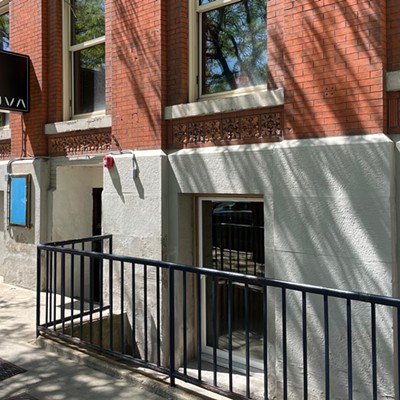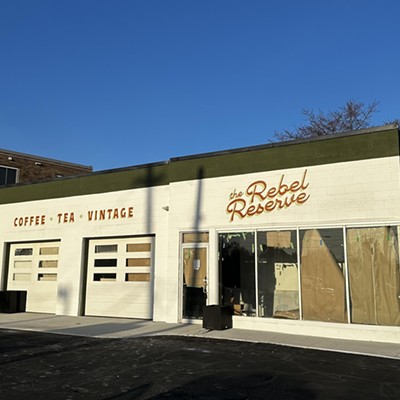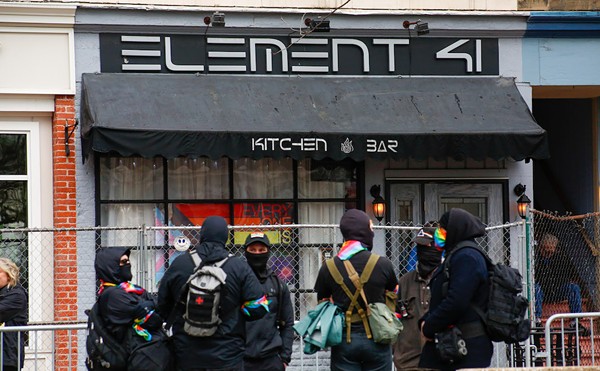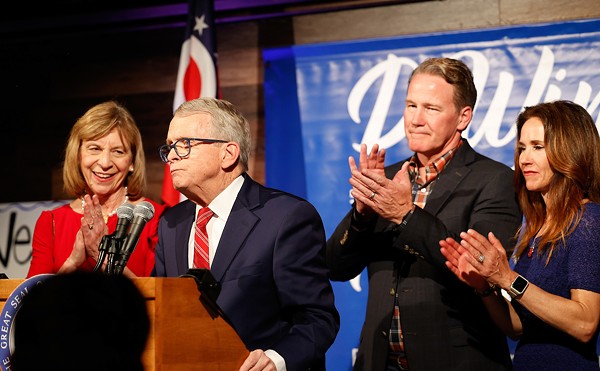Walsh returned from Southern California a few days later and spoke by phone with Ryan Prendergast, a Jamaican who worked at a Lee Road record shop. They agreed to meet at their usual spot, the Euclid Hospital parking lot.
"Just call me when you're almost there," Prendergast said.
"Don't leave me sittin' there," Walsh responded.
Twice that day, the men met at the hospital and exchanged plastic bags under the watch of the Caribbean/Gang Task Force.
A week before the meet, the FBI put wiretaps on Walsh's cell phone and two phones belonging to his 70-year-old father, Robert Sr., who left the Cleveland police force in 1956 for a career in crime. Over the years, the elder Walsh had been arrested for counterfeiting, burglary, and grand larceny. In 1980, he was sent to prison for masterminding a plot to fly four tons of pot and 200,000 Quaaludes from Colombia to Louisiana in an old military transport plane.
Walsh was paroled in 1993, but the prison experience failed to reform him. In the spring of 2000, his name emerged during a drug investigation that began with a minor coke dealer who lived in University Heights. Using wiretaps, investigators followed the cocaine up a chain of dealers, where they reached Walsh and his son.
Investigators determined that the Walshes transported about 12 kilos of cocaine a week from California to Cleveland on commercial flights. The Walshes and their associates tried to be cryptic, but it didn't take a codebreaker to understand the deeper meaning of "green sweaters" and "Barry White albums." In one tapped conversation, Junior complained about their supplier raising the price to a "Bucky Dent" per kilo. Major League shortstop Bucky Dent wore No. 20 when he played for the Yankees in the late '70s and early '80s. The dope, in other words, cost $20,000.
Eavesdropping one night, FBI Special Agent Steve Vogt figured out how the Walshes were able to slip the cocaine past airport security. Walsh Jr. discussed his most recent plane trip with a guy named Joe Sheehan, who was oddly knowledgeable about the flight. "I saw that," Sheehan said when Walsh told him he had changed seats. Sheehan was privy to airline computer records, Vogt thought. He checked it out: Sheehan supervised American Airlines baggage handlers at LAX.
Investigators spent another week watching and listening before moving in with warrants. They grabbed Walsh Jr. and Prendergast during a buy. Walsh Sr., Sheehan, and another baggage handler were picked up in California. At the Carlyle, the Walshes' Lakewood residence, the task force found six kilos of cocaine that had yet to be distributed. Ultimately, 30 defendants pleaded guilty.
The Caribbean/Gang Task Force lives to make cases like U.S. v. Robert Walsh, et al. Since 1990, the multiagency unit has seized more than 400 kilos of cocaine, 1,300 kilos of marijuana, 650 weapons, and $9 million. Dozens of drug dealers have been locked away, some for life.
The war on drugs is often compared to the war in Vietnam in that inertia seems to be the guiding policy. Law enforcement is trying to empty an ocean, one crack vial at a time. Sad, scruffy users and peddlers constitute the mass of drug arrests. Abusers outnumbered the traffickers sent to Ohio prisons three to one last year. And for what? The drug trade has never been more robust.
The Caribbean/Gang Task Force hovers above the criticism that the drug war claims more casualties than results. Its mission is to topple the large enterprises that move by stealth and sell in bulk. "We've taken bad, dangerous people off the street," Cleveland Police Lieutenant and task force veteran Donald Duman says. "The rest takes care of itself."
Ah, the name. It's dated now, but no one has seen reason to change it or thought of anything better.
The Caribbean/Gang Task Force was created in 1987 in response to the menace of Jamaican drug posses, which are credited with taking crack national. Jamaican gang members arrived in the U.S. in 1980, fresh off a bloody election in their home country. They dealt marijuana before finding cocaine more lucrative. The young crack trade was crowded in New York and Miami, so the Jamaicans looked to the rest of the country, dispatching posses to stake claims in open cities like Washington, Baltimore, and Kansas City.
Jamaican gangs were astonishingly violent. Outsiders wherever they set up shop, they usually asserted their authority with gunfire. Over a three-year period, they were said to be responsible for 600 slayings nationwide. One gang was called the Shower Posse, because it took out rivals by firing automatic weapons into crowds. "I've never seen a group splatter themselves like the Jamaicans do," an INS agent told The Washington Post in 1988.
In Cleveland, police suspected that a dozen unsolved homicides were the remains of Jamaican incursions. Normally, ego, bureaucracy, and the cultural differences between local and federal law enforcement doom cooperation, but the Jamaican threat was seen as too pernicious to drown in administrative vinegar. At a meeting at the U.S. Attorney's Office, cops and the feds agreed to work together.
They borrowed a model from an existing federal task force, where agents and prosecutors worked drug cases side-by-side. Then, as today, the Caribbean/Gang Task Force ran its operations from inside the U.S. Attorney's Office. Detectives from Cleveland, Shaker Heights, and the Ohio Bureau of Criminal Identification & Investigation, as well as agents from the ATF, FBI, and INS, formed the initial core.
Resources were scarce. Cars and radios were donated by participating agencies. Duman remembers hitting up Shaker Heights Police Chief Walter Ugrinic for a few hundred bucks so he could make a buy. "We had nothing," Duman says.
Whether by luck or the work of the task force (while executing a search on one suspected drug house, investigators found news clippings of past busts), Jamaican posses didn't establish the footholds here that they did on the East Coast. In fact, contrary to popular thought, Cleveland got off easy insofar as crack-related gang violence that plagued other cities. Washington, D.C.'s homicide rate, for instance, increased 228 percent from 1985 to 1991; Cleveland's rose 34 percent. "Fortunately, I think, groups did not become controlling," says Assistant U.S. Attorney Ken McCargh, who prosecutes federal drug cases in Northeast Ohio. "They weren't able to carve out their turf."
So the task force turned its gaze to individual entrepreneurs. The crowning bust of the early years began with a tip from Independence. A police officer worked off-duty at a hotel near the highway, and he noticed a number of vehicles, some with out-of-state tags, making return visits to the lot. The task force put the hotel under surveillance and got wise to a Colombian named Jorge Escobar, who had lived in New Jersey before he bought a condo here.
Escobar, investigators determined through surveillance and wiretaps, supplied area dealers with large amounts of cocaine. In one bugged phone call, Escobar discussed the collection of $920,000. He was able to transport up to 100 kilograms at a time in a van with a tricked-out ceiling. Smaller quantities he carried by air.
He and another man were eventually arrested at Hopkins with two kilos and $66,000 cash.
Escobar refused to take a plea. But on the second day of trial -- a day in which his brother-in-law testified against him -- Escobar pleaded guilty to running a continuing criminal enterprise, better known as the kingpin statute. He was sentenced to 27 years and forfeited $250,000.
Narcotics work is an almost artistic endeavor, like designing a house or painting. Drug cops cast for crimes that will occur in the future, not ones that already happened. Details are important; patience is demanded. "It's not something you develop on a Monday afternoon and finish on a Tuesday morning," says former Cleveland Detective and task-force member Mark Kabat.
Investigators live on dealers' time. Kabat spent a few Christmas Eves chasing leads. At a moment's notice, he boarded planes for L.A. and gassed up cars for Florida in order to tail suspects. The rush, Duman says, is when investigators get that first nibble on the hook, that bit of information that feels like it could lead to a serious player.
Most cops aren't cut out for it. They'd rather deal with fixed objects in time and space -- a dead body, a burglarized home, a rolling stop -- than do the reconnaissance work narcotics requires. Cleveland FBI Special Agent in Charge Joseph Persichini Jr. compares drug work to "reverse engineering" in the sense that investigators make simple events more complicated. Busting a street-corner dealer is easy; penetrating an organization is not.
Narcotics investigators could accomplish little without informants. Some sources have loved ones they'd like to see cops bust, either to scare them straight or (in the case of a former girlfriend) put them in a cage. Others may be dealers or users themselves who want a way out. But it's rare that an informant is compelled by civic duty. "Usually, it's money," says Special Agent Vogt, who pays for information.
Once investigators verify tips, wiretaps do most of the heavy lifting. The perception that the feds are eavesdropping on everyone and their grandmother is ludicrous, officials say. "If only they knew what a pain in the ass it is to set up a wiretap," Assistant U.S. Attorney Bill Edwards says.
To obtain authorization, investigators first have to write lengthy affidavits that present what is known and what can be gained from bugging a phone. Only after the Attorney General's Office in Washington gives the OK can investigators approach a judge with the evidence.
Vogt is an in-house legend when it comes to wiretap affidavits. He has written between 70 and 80, believed to be the most by any agent in the bureau. "I don't think there's anyone even close," Special Agent Bob Hawk says. Vogt is a large reason the Cleveland FBI office, the bureau's 18th largest, ranks fifth in drug arrests, convictions, and seizures.
"He's a machine," says Persichini. "I wish I could clone it."
A Maryland native and lawyer by training, Vogt was assigned to Cleveland in 1989, after graduating from the FBI academy. He's worked narcotics almost exclusively, though his conservative gray suit and boyish face suggest a branch manager for a bank.
Field work is not nearly as glamorous as it looks on TV. Agents don't live on houseboats and drive Ferraris. They stake out airport terminals and sit in rooms that receive wiretap transmissions like faraway messages from space. Vogt enjoys the cerebral nature of the work, which he describes as "long-term, slow-paced, thorough." Investigations typically last six to nine months, and a few have stretched to two years. An adrenaline junkie would find the job a yawn factory. "You can put more people in prison from your desk than you can driving around the streets," he says.
Sometimes it's a filthy job. Task-force investigators confirmed the residence of Larry Burks, a suspected cocaine dealer, by scouring the trash outside his girlfriend's house and finding mail with his name on it. Investigators dread summertime. Sun beats the streets, everything smells, and the maggots that live in garbage look like moving rice.
Perhaps the most difficult challenge is knowing when to stop. If investigators are too anxious, if they move too soon, they can flatten their cases. Kabat remembers gathering a SWAT team to take down a dealer. They were about to swarm when their informant indicated that the suspect wasn't holding any drugs. They held back until his next shipment snowed in.
"You can't always wait for that," says Cleveland Deputy Police Chief Patrick Stephens, who worked on the task force when he was a lieutenant. "That person can do a lot of damage before you get them."
Investigators seem to respect their prey, at least for not being blithering idiots. Burks, who supplied the East Side of Cleveland with cocaine, was skilled at building firewalls and moats between himself and the drugs. He used relatives and girlfriends, safe-deposit boxes and unoccupied apartments, cloned cell phones and legitimate fronts. Most dealers sound like contractors when discussing business on the phone. Cocaine becomes "sockets," "white tile," "paint," and of course, "stuff." Burks and his associates used a sort of pig Latin. I'm still kizilo to sizell.
Burks was also able to charm women not normally cast as gangster molls. Cleveland elementary schoolteacher Darlene Sledge made drug runs on his behalf to California and Las Vegas. Cleveland Police Officer Sonia Johnson tipped Burks to what she thought was an FBI truck parked outside an apartment building he owned. "You down with me like Bonnie down with Clyde?" Burks once asked Johnson, measuring her allegiance.
The task force dismantled Burks's operation in 1996. Twelve people from Ohio, New York, and Kentucky were arrested, including an Eastlake car dealer whose business Burks used to sanitize his money. An unrepentant Burks -- asked if he had anything to say before he was sentenced, he told the judge, "Nope" -- received life in prison for money laundering and conspiracy to distribute cocaine. Sledge got five years. Johnson was thrown off the force and served six months.
Other dealers aren't as sophisticated. Rap group manager Matthew Millhouse came under suspicion during a 1995 joint investigation between the task force and the IRS. Agents traced $1.6 million Millhouse and another man had wired to cocaine suppliers on the West Coast.
The task force got a warrant to search Millhouse's residence. The basement was largely bare, except for a rug. Officers pulled back the rug, and the cement underneath looked a different shade from the rest of the floor. They brought in a winch to pull away the discolored chunk and found two safes holding $300,000.
"I would have carpeted that thing wall-to-wall," Stephens says.
While investigators understand dealers' motives, few tears are shed when the men at the top are led away in handcuffs. Cops and prosecutors reserve special contempt for the thugs who direct others to stand in harm's way or do harm to others. In 1999, Jermaine Levy was about to begin serving a 20-year sentence for running a cocaine operation that brought in $1 million worth of powder a month from Los Angeles. A few days before he was to report to prison, he broke his electronic ankle monitor and watched from a block away as underlings threw acid in the face of an East Cleveland hairdresser, a former courier who had cooperated with investigators. Levy received an additional sentence that ensured he would have to serve the full 20.
"There is absolutely no reticence to see these people go to prison," McCargh says.
Kabat wonders how dealers sleep at night. He doesn't believe they toss and turn over the lives they ruin, but from the fear of authorities closing in. "As long as they have to deal with other people, sooner or later it's going to come crashing down."
Since the task force is housed inside the U.S. Attorney's Office, Ken McCargh takes on the role of den mother. A laconic Akron native, McCargh worked on the Louis Stokes-chaired House committee that investigated the assassinations of President Kennedy and Martin Luther King Jr. He seems to lack the showman gene woven into so many attorneys' DNA. "A lot of people didn't think it would last," he says of the task force -- words that, for him, pass as bluster.
McCargh presides over something of an all-star team for local police, who seldom have the time or the energy to work drug investigations up more than one rung of the ladder. "You're just spinning your wheels, arresting street dealer after street dealer," says Parma narcotics Detective Kevin Monnolly. The task force allows officers to tear off a meaningful pound of flesh.
About two dozen local, state, and federal law enforcement agencies have loaned staff and support at one time or another. A few have left disappointed. In 1993, the Middleburg Heights PD grumbled about the size of the disbursements it received from forfeited assets and pulled its officers. McCargh says he understands if an agency feels it can't leave its community an officer short, but he resents the notion that dollars define effectiveness. "The task force does not exist to generate income," he says.
Two stories that broke last year diminished the task force's reputation as the gold standard of Ohio law enforcement. First, a part-time member pleaded guilty to bribery and extortion. Parma narcotics Detective James Wischmeier admitted that he received motorcycle parts and two furnaces from an informant, convicted cocaine dealer Steven Vozar. Wischmeier also admitted to divulging police information to Vozar. He was sentenced to 15 months in federal prison.
Wischmeier "had a relationship he shouldn't have had," according to Monnolly, his former partner. "I was betrayed. Everybody down there was betrayed."
A few months after Wischmeier took a plea, four officers -- two from Cleveland, one from Independence, one from RTA -- were taken off the task force. Word leaked that the FBI suspected the officers of pocketing valuables and pornography during raids. The FBI had installed hidden cameras in a house and sent the officers on a phony search. Two were caught on tape helping themselves to porn magazines.
No criminal charges were filed, and by all indications, none of the officers faced administrative charges. The matter, though, seems to have left a haze of distrust between the feds and local police. The FBI and Cleveland Police refused to discuss the case. McCargh says only, "The matters were presented to their chiefs and [the officers] were reassigned."
Robert Walsh Sr. was always a bad egg. Even as a policeman in the 1950s, he was suspected of having ties to organized crime. Jimmy "the Weasel" Fratianno wrote in his mob tell-all that in 1969, Walsh drove enforcer Julius Petro to the Los Angeles airport, where Ray Ferritto shot Petro in the head. Walsh was never charged. Ferritto was later convicted in the bombing death of Danny Greene.
Though in failing health (diabetes, heart bypass surgery), Walsh Sr. kept on top of the California-to-Cleveland operation he ran with his son. Late one night, he called Junior and asked if he had collected the money they were owed for a previously delivered kilo.
"No, I didn't even talk to him," Son said.
"Well, you can't let that stuff lay around with Freddy," Dad responded.
It was as if the lawn needed mowing. On a different occasion, Walsh Jr. whined about his cut. "I'm doin' all this fuckin' work here," he told his father.
Of all the conspirators, Walsh Sr., now 73, received the longest sentence: 20 years. Bedridden, Walsh will spend his remaining days in a federal prison near the Mayo Clinic in Minnesota. The case the task force put together was impenetrable. "They dotted every 'i' and crossed every 't'," says Angelo Lonardo, Walsh's attorney.
What pleased the task force most about the Walsh case were the leads it generated in far-flung jurisdictions. The FBI and DEA spun off investigations in New York, Chicago, Denver, and San Juan. Arrests and seizures are piling up. "That's the biggest contribution the task force can make," McCargh says.
The work never ends; only the cast of characters, the methods of deceit, and the drugs of choice change. In the mid-'90s, a number of large drug organizations turned to marijuana, thinking that pot draws less scrutiny and lighter penalties. Heroin has made a steady comeback. Sentencing laws are catching up with club drugs like ecstasy. Methamphetamine, the pox on the plains states, has yet to proliferate in Cleveland. Cocaine and crack are as reliable as the phases of the moon.
Despite the task force's triumphs -- Vogt says that now, any capture less than 20 kilos isn't a big deal -- drugs are as easy to come by as they've ever been. For investigators, it's best if they think of their work in economic terms. If street prices increase, they know they've affected supply. Otherwise, the long view isn't a very uplifting picture. When McCargh says the task force will continue until the drug war is won, he sounds more resigned than resolute.













